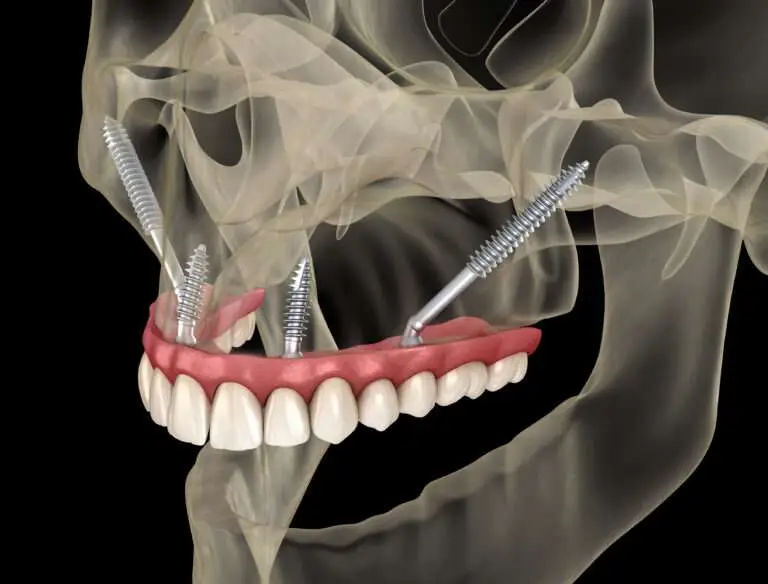Side Effects of Dental Implants: What You Need to Know
Dental implants have revolutionized dentistry by offering a strong and durable solution for replacing missing teeth. However, as with any surgical procedure, dental implant surgery can have potential side effects and complications.
This article discusses the side effects associated with dental implants, covering both common and long-term complications. The aim is to equip you with the information necessary to make a well-informed decision.

Understanding Dental Implants and Their Functionality
What Are Dental Implants?
A dental implant acts like a synthetic root, typically made from materials like titanium or zirconia, that supports a prosthetic tooth or teeth, depending on the patient’s needs. Dental implants do not have nerves like natural teeth, so sensations around the implant come from the gum line tissue unless there is nerve damage in the gum.
The Benefits of Dental Implants
The implant, whether fitted with a prosthetic tooth like a crown or an entire arch of prosthetic teeth, mimics the look and function of natural teeth, significantly improving life for partly or wholly edentulous people.
Dental implants have minimal side effects and a success rate of over 95%. When a Certified ZAGA Center, also known as Smile24h Expert Clinic, performs the treatment, they do their best to reduce the chance of tooth implant side effects. ZAGA Doctors specialize in advanced dentistry and dental implants, always working aligned with the ZAGA Concept and its “patient-first” approach. This expertise helps ensure a successful and safe procedure with tailored-made outcomes that will address each patient’s concrete needs.
Common Side Effects of Dental Implant Procedure
Dental implants are an excellent way to replace many teeth or one single tooth. Still, it’s essential to consider the potential side effects. Problems with implants can occur if they don’t fuse properly with the bone or break after surgery.
Some common side effects of dental implant surgery are swelling and bruising. However, these symptoms are part of the body’s natural healing process. Swelling is a controlled form of trauma, where cells rush to the implant site to aid in healing, causing fluid build-up and inflammation. Typically, swelling and bruising peaks 48-72 hours after the surgical procedure and lasts five to seven days, the same as minor discomfort or pain that should subside within a week.
These side effects are completely normal as the body responds to the surgery, but it’s important to pay attention to their intensity and duration: if swelling or pain remains for more than two weeks or is unmanageable, visit your specialist dentist straight away to check if there’s any problem with the implants and prevent any possibility of infection or implant failure.
Managing Swelling and Pain
To alleviate swelling, apply a cold compress to the affected area for 20 minutes, followed by a 20-minute break. You should do this during the first 24 hours after surgery. After three days, use warm compresses. Your dentist may give you pain medication and prescribe antibiotics to reduce swelling and prevent inflammation.


Preventive Dental Care For Dental Implant Surgery
1. Pre-Surgery Preparations
Before getting dental implants, it’s crucial to have a complete dental check-up. This will help make sure you don’t have gum disease or other medical problems that could affect the procedure or the healing progress.
In case you need any treatment before the implant surgery, the dentist will address it and include it in the treatment planning.
2. The Surgical Process: What Happens During Oral Surgery
Dental implants require oral surgery, during which a post is inserted into the jawbone. An oral surgeon or a dental specialist trained in advanced implant dentistry, like Certified ZAGA Doctors, typically performs these types of advanced dental implant procedures. The type of dental implant treatment you receive may vary depending on the number of implants and your oral health.
3. Post-Surgery Dental Maintenance: Ensuring Longevity
Dental implants can last for many years, even decades, especially when one takes proper care of them. Your oral surgeon will provide guidelines for dental care post-implant surgery to help minimize risks and will regularly check the implants and surrounding tissues to catch and address any issues early. Listening to your oral surgeon’s advice is vital to avoid problems and ensure your implant works well. Follow their guidance on eating and caring for your teeth.
At the same time, regular dental check-ups are necessary to monitor your implant, gums, and bones, just as good oral hygiene is crucial for the success of your dental implant and overall oral health. Dental cleanings and check-ups can prevent gum disease, which can damage the bone and tissue supporting your implant.
4. Special Cases: Bone Grafts and Sinus Cavities
Sometimes, a bone graft may be necessary if there’s insufficient bone in your jaw to support the implant. Bone grafting works by placing graft material into the affected area, which can be either natural bone from another part of your body or a synthetic substitute. This promotes bone regeneration and fuses graft material with newly regenerated bone. This process, called osseointegration, can last 3 to 6 months, depending on individual healing rates.
On the other hand, extra care is necessary when placing implants in the upper jaw to prevent sinus problems and ensure proper placement. These additional steps are important for the implant’s success, as they avoid complications and secure the implant in the jaw.
5. When Things Don't Go as Planned: Dental Implant Failure
Signs of infection at the implant site include redness, swelling, and discomfort. If you experience these symptoms, contact your dentist immediately. Long-term complications can consist of issues with the bone fusing with the titanium screw, leading to implant failure.
Implant failure or loss of an implant is a severe side effect associated with dental implants that can happen due to factors like wrong implant placement, not enough bone density, neglected oral hygiene, smoking, or long-term issues like infection.
Although dental implant failure is rare, it can happen. If an implant fails, a dentist can place a new implant after a period of healing. The success of the new implant will depend on finding out why the previous one failed and fixing the issue.
Bibliography
- Liaw K, Delfini RH, Abrahams JJ. Dental Implant Complications. Semin Ultrasound CT MR. 2015 Oct;36(5):427-33. doi: 10.1053/j.sult.2015.09.007. Epub 2015 Oct 9. PMID: 26589696. Abstract: This study delves into the complications that can arise from dental implant procedures, including implant failure and infection.
- Přikrylová J, Procházková J, Podzimek Š. Side Effects of Dental Metal Implants: Impact on Human Health. Biomed Res Int. 2019 Jul 10;2019:2519205. doi: 10.1155/2019/2519205. PMID: 31360706; PMCID: PMC6652050. Abstract: This research focuses on the side effects of dental metal implants and their impact on human health, including potential allergic reactions and other complications.
- Compton SM, Clark D, Chan S, Kuc I, Wubie BA, Levin L. Dental Implants in the Elderly Population: A Long-Term Follow-up. Int J Oral Maxillofac Implants. 2017 Jan/Feb;32(1):164-170. doi: 10.11607/jomi.5305. PMID: 28095520. Abstract: This paper discusses the long-term effects and success rates of dental implants in the elderly population, emphasizing the importance of proper care and maintenance.







